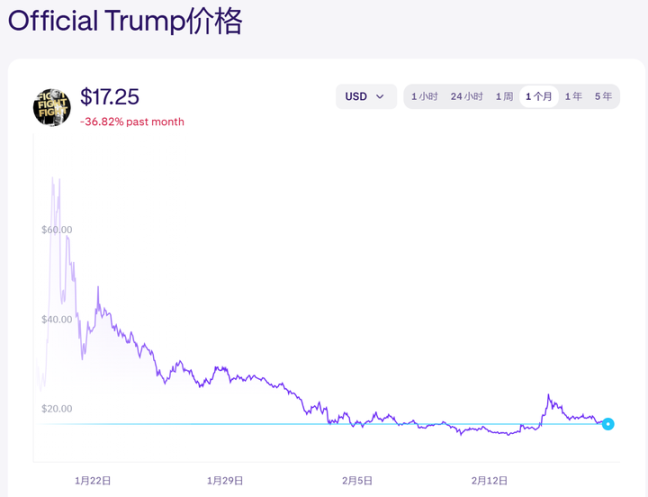From TRUMP to LIBRA, Celebrity Meme Coin destroyed the original crypto bull market?

Reprinted from panewslab
02/18/2025·2MAuthor: Dave Birnbaum
Compilation: Vernacular Blockchain

Argentina President Javier Milei on November 19, 2023 in Buenos Aires
A series of compelling "Memecoin runaway" incidents are raising concerns that the "crypto" frenzy is hurting Bitcoin's reputation as a prudent monetary asset. From the Trump administration’s support for TRUMP Token, Memecoin, the First Lady’s platform, to the LIBRA scandal in Argentina, these speculative frenzys have repeatedly made headlines, making Bitcoin—a number that is most likely to become the cornerstone of the 21st century economy Currency – the line between various hype items that have pulled up sell-offs has become blurred.
No matter what, Bitcoin will not be affected too much. But what may be unsustainable is Trump’s plan to reform the regulatory system of digital assets to provide financial innovators with much-needed frameworks and clear guidance. On the contrary, this administration's naive and indiscriminate advocacy of the crypto market is actually hurting retail investors - this is undoubtedly a bitter reality for the Bitcoin community.
More broadly, the global liberal movement has finally entered the center of power, but it may be stigmatized by financial speculation at this critical moment, just as people are expecting "real adults" to take over. Javier Milei, a learned economist and a staunch supporter of a sound currency, has promised radical measures such as closing the Argentina central bank and pushing forward the development of gold and Bitcoin.
Now, one after another, crypto scams have been staged one after another, and the Bitcoin community’s long-standing warnings about “crypto casinos” are being verified. And it is not just the investors who were cut off. Most new entrants still do not realize the essential difference between Bitcoin and speculative altcoins and therefore may ignore the potential of Bitcoin as a neutral and tamper-free currency. Now, it’s time for influential figures and policy makers to make it clear: Bitcoin is the only digital asset that can provide truly sustainable value to large institutions and the global economy.
1. The rise and collapse of Memecoin
Recently, the surge in Memecoin has created a huge boom, and has also brought countless heartbreaks. These events prove again the serious consequences of confusing Bitcoin with the entire crypto market.
1) LIBRA farce in Argentina
In Argentina, an crypto project called LIBRA turned into a national scandal almost overnight. In mid-February, the newly elected President Javier Milei, a self-proclaimed libertarian and Bitcoin supporter, posted on social media to support LIBRA Token and promote it as a A private initiative aimed at promoting the Argentina economy. Followers and retail investors called by Milei flocked to the market, and LIBRA prices instantly soared from $0 to nearly $5.
However, in just a few hours, the price of LIBRA plummeted by more than 80%, falling below USD 1. Blockchain analysts quickly revealed the reason: the internal wallet sold almost immediately after the Token went online, cashing out more than $107 million, while ordinary investors could only watch the funds evaporate. The Argentine FinTech Association also admitted that the operating model of this incident is no different from the typical "running away" scam.
2) Political storms broke out quickly
Opposition MP Leandro Santoro quickly spoke out, saying: "This scandal has brought shame to us internationally and we must initiate an impeachment request against the president." Mile immediately deleted his propaganda post , and hurriedly distanced himself from LIBRA, arguing: "I don't know the specific situation of the project, and once I know the details, I decided not to promote it anymore."
But for thousands of trapped investors, everything is a foregone conclusion. A token endorsed by the country's top leader eventually proved to be a "selling shipment" scam, hushing Argentina's first president who truly understands the economy in at least a century. The farce fully demonstrates how irresponsible cryptocurrency policies can undermine the credibility of the entire political movement.
3) Trump 's TRUMP Token
In the United States on the other side of the planet, a larger Memecoin frenzy is taking place, and this time directly involves the nation’s top leaders.
In January this year, U.S. President Donald Trump launched an official Memecoin TRUMP on the Solana blockchain. The token was promoted as "the only official Trump Memecoin" and used Trump's personal brand and the trust of the MAGA (Make America Great Again) movement to hype before its inauguration.
The extent of this fanaticism is extremely rare even in the cryptocurrency market. Within just a few days after its launch, the price of TRUMP soared, with a total market value exceeding US$14.5 billion, and the price of a single coin rose to about US$73. This historic increase is exactly synchronized with the Crypto Ball held by DC in Washington, DC, which was created by tech investor and the Trump administration's "Crypto Tsar" David Sacks Host.
However, after the party carnival, reality quickly backfired. As guests of the crypto event were still hanging over, TRUMP prices plummeted in a few days. By early February, in just two weeks, the price of the token had fallen by two thirds.
On-chain data analysis company Chainalysis found that the 50 largest holders each cashed out more than $10 million, while about 200,000 retail investors suffered heavy losses in the plunge. In the end, insiders made a big profit, and a large number of retail MAGA supporters who may have entered the market due to the "Trump" brand became the takeover.
According to Reuters, Meteora, the trading platform launched by $TRUMP Token, will rebate the token issuer for each transaction. In just two weeks, the team behind TRUMP earned about $86 million to $100 million based on transaction fees.

Source: kraken.com, as of February 18
4) Melania Trump 's Memecoin Mania
A few days after the launch of TRUMP Token, the first lady of the United States, Melania Trump, also quickly followed up and used her personal brand to launch a Memecoin. Less than 12 hours before the presidential inauguration, she announced the issuance of personal Token MELANIA on the Solana blockchain.
Once the token was launched, it immediately triggered a new round of speculation. Many people who witnessed early investors in TRUMP make a big profit think this is their "second chance". Within just a few hours after the issuance, MELANIA's price soared 24,000%, reaching a maximum of about $13, with a total market value of nearly $1.8 billion in one day.
However, reality quickly hit the head-on. Just the same weekend, MELANIA plunged 80% from its highs, down below $3. Similar to TRUMP, MELANIA's token allocation and issuance intentions have also been questioned. Analysts point out that 80% of TRUMP Token’s supply is held by a single giant whale address, and MELANIA is facing similar high centralization problems.
**5) "First Family"'s cryptocurrency speculation has encountered
bipartisan criticism**
The Trumps' cryptocurrency move quickly attracted criticism from both parties in the US political arena. Although the outside world's allegations of self-improvement and wealth may be difficult to establish - after all, the Trump family itself is already extremely rich and does not need to rely on the means of getting rich quickly. However, more realistic and disappointing, Trump’s two sons, Donald Trump Jr. and Eric Trump, and the Trump administration’s “cryptocurrency” The judgment that the Tsar David Sacks showed in this series of events was far less than the maturity that their positions should have.
2. Trump's crypto policy: Bitcoin's double-edged sword
The above scandals all have one thing in common: they all involve speculative altcoins that rely on hype, insider manipulation and lack of transparency, which is a radical opposite of the philosophy represented by Bitcoin. For years, veterans in the Bitcoin community have been working to differentiate between Bitcoin and the "crypto market" precisely because they know the harms of this confusion.
The Bitcoin community quickly draws a line with these farces. Unlike Bitcoin, the prices of these altcoins rely entirely on "Boshita Theory" speculation, which is a neutral, decentralized payment network with hundreds of millions of users and follows predictable monetary policies. Such scams not only harm investors, but may also tarnish the reputation of the entire digital asset field and even affect Bitcoin.
Nevertheless, the Bitcoin community hopes that the Trump administration will bring a reasonable regulatory environment, promote innovation in the fintech industry, and accelerate the popularity of Bitcoin. For millions of Americans holding Bitcoin, tax reforms and increased regulatory transparency are undoubtedly welcome.
However, advocating cryptocurrencies indiscriminately may do more harm than good. If the public's impression of "cryptocurrency" is only stuck with these scams that pull shipments up, rather than recognizing Bitcoin's potential in combating inflation and financial instability, the long-term development of the crypto industry will be severely hampered. If Trump’s so-called “promoting the development of the crypto industry” is simply acquiescent or even involved in these hypes, it may eventually trigger a more severe regulatory crackdown. Once the market crashes, the government may regard all digital assets as a source of risk, and even Bitcoin companies and users will not be spared.
Poor supervision often comes from negative public opinion storms. If the collapse of LIBRA and TRUMP is used as an excuse for regulatory blows, some policymakers hostile to cryptocurrencies may take the opportunity to target Bitcoin — although it is not involved in these scams at all — and introduce punitive new rules.
3. It's time to reiterate your commitment to Bitcoin
The most urgent task is to formulate a clear policy to encourage the widespread use of Bitcoin as a reserve asset, payment network and innovation carrier. Policy makers and influential figures in the fields of technology and finance have the responsibility to clearly distinguish Bitcoin from "cryptocurrency". In the current farce, key figures like David Sacks and Chamath Palihapitiya can play a crucial role.
As a well-known venture capitalist and political donor, Sax hosted the "Crypto Ball". But instead of focusing on the glitz hype of meme coin parties, these industry thought leaders should use their influence to popularize the unique value of Bitcoin to new entrants and remind them to pursue the risks of altcoins surge.
Chamas Parihapitiya, an early investor in Bitcoin, has a huge audience. He has repeatedly stated that Bitcoin may be the "ultimate insurance" and will occupy a central position in the future financial system. However, he is also an investor in the Solana ecosystem, which is the technical cornerstone of a series of recent shipment scams. This contradictory message is not only confusing, but also weakens the core value of Bitcoin. Given Chamas' influence in Silicon Valley and Wall Street, he is fully capable of explaining to the market: how the basic attributes of Bitcoin (scarcity, decentralization, security) make it very different from those speculative Solana Tokens.
For Sax, Chamas and all those influential in the tech and finance sectors, their mission should be to responsibly use their platform. Compared to holding a Crypto Ball or high-profile forecasting currency prices, educating the public may not be eye-catching enough, but it is crucial in the moment. These industry leaders should focus on how Bitcoin empowers the global financial system, such as practical applications in high-inflation countries or unbanked people, and contrast them with the short commitments of meme coins. They can push the industry to establish norms to view Bitcoin as an emerging digital commodity and reserve asset, while unaudited altcoins should be classified as risk stocks or gambling applications. Only in this way can investors reduce the risk of falling into a scam and truly make the market understand the value of Bitcoin.
Now is the time to take action. Industry leaders, investors and policy makers must come forward, demand transparency, expose bad behavior, and defend the value of Bitcoin as a sound currency. Only by clearly supporting Bitcoin and firmly opposing scams can the focus of the market be back on track - how Bitcoin improves society. For investors' livelihoods and the future application of Bitcoin, this moment of silence or compromise can be expensive.
It's time to make Bitcoin great again.



 jinse
jinse